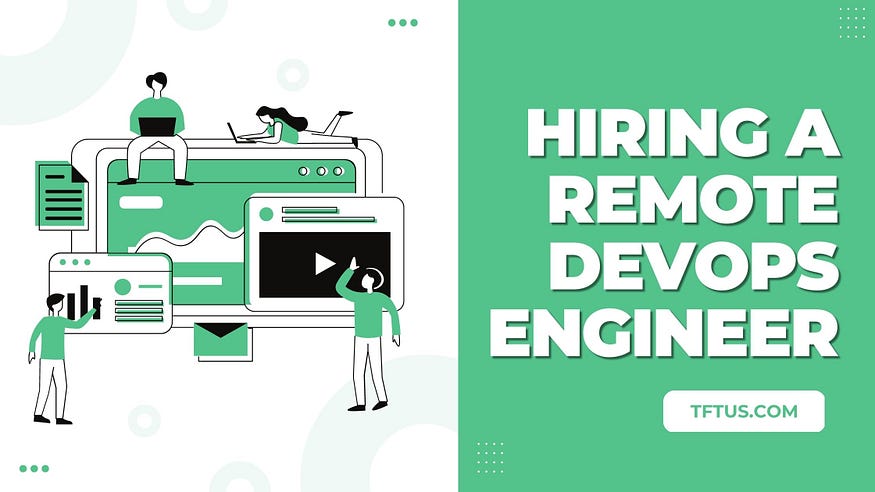Hiring a Remote DevOps Engineer: Best Practices and Considerations
As businesses continue to rely heavily on technology for their operations, DevOps has become an essential part of software development. DevOps is a methodology that integrates software development and IT operations to create an efficient and effective software development lifecycle. To keep up with the demands of the modern business landscape, many organizations are now opting for remote DevOps engineers. In this article, we will explore the best practices and considerations for hiring a remote DevOps engineer.

Introduction
As the global workforce continues to shift towards remote work, hiring a remote DevOps engineer has become a popular choice for many businesses. However, remote hiring presents unique challenges that must be addressed to ensure the successful recruitment and integration of remote employees. In this article, we will provide you with the best practices and considerations for hiring a remote DevOps engineer.
What is DevOps?
DevOps is a methodology that integrates software development and IT operations to create a streamlined software development lifecycle. DevOps engineers are responsible for developing, testing, deploying, and maintaining software applications. DevOps emphasizes collaboration and communication between developers and operations teams to ensure a continuous delivery of high-quality software.
Why Hire a Remote DevOps Engineer?
Hiring a remote DevOps engineer offers several benefits, including access to a wider pool of talent, cost savings, and increased flexibility. Remote work also allows businesses to reduce overhead costs associated with traditional office setups. Additionally, remote work has been shown to increase employee satisfaction and retention rates.
Best Practices for Hiring a Remote DevOps Engineer
When hiring a remote DevOps engineer, it is essential to follow best practices to ensure a successful recruitment process. Here are some best practices to consider:
1. Understanding the Role
Before beginning the recruitment process, it is essential to have a clear understanding of the role you are hiring for. This includes the skills, experience, and qualifications required for the job. Having a clear understanding of the role will help you create an accurate job description and attract the right candidates.
2. Identifying Technical Skills
Technical skills are an essential requirement for a DevOps engineer. It is essential to identify the specific technical skills required for the job and evaluate candidates’ proficiency in these skills. Common technical skills required for a DevOps engineer include experience with cloud computing, containerization, automation tools, and scripting languages.
3. Evaluating Soft Skills
Soft skills are equally important when hiring a remote DevOps engineer. Soft skills such as communication, collaboration, and problem-solving are critical to the success of remote work. It is essential to evaluate candidates’ soft skills during the recruitment process, as they are a strong indicator of how well a candidate will fit into your team.
4. Considering Experience
Experience is an essential factor to consider when hiring a remote DevOps engineer. Candidates with relevant experience in software development, system administration, and IT operations are more likely to have the technical and soft skills required for the job. It is essential to evaluate a candidate’s experience through their work history, portfolio, and references.
5. Assessing Cultural Fit
Assessing cultural fit is critical when hiring a remote DevOps engineer. Candidates who share your company’s values and culture are more likely to integrate seamlessly into your team. During the recruitment process, it is essential to evaluate a candidate’s values and work style to ensure a good fit.
6. Utilizing a Hiring Process
A structured hiring process is essential to ensure a successful recruitment process. This includes creating a job description, sourcing candidates, screening resumes, conducting interviews, and evaluating candidates. It is also essential to involve team members in the recruitment process to ensure a good fit with your team.
7. Providing Onboarding and Training
Onboarding and training are critical to the success of remote employees. It is essential to provide clear expectations, goals, and objectives to ensure that remote employees understand their role and responsibilities. Additionally, providing training and development opportunities can help remote employees stay engaged and grow within the company.
Considerations for Hiring a Remote DevOps Engineer
Hiring a remote DevOps engineer presents unique challenges that must be addressed to ensure a successful recruitment process. Here are some considerations to keep in mind:
1. Communication and Collaboration
Effective communication and collaboration are critical to the success of remote work. It is essential to establish clear communication channels and tools to ensure that remote employees can effectively communicate with their team members.
2. Time Zone Differences
Time zone differences can create challenges for remote employees, particularly when it comes to communication and collaboration. It is essential to consider time zone differences when hiring remote employees and establish a schedule that accommodates everyone’s availability.
3. Security and Confidentiality
Security and confidentiality are critical considerations when hiring remote employees. It is essential to ensure that remote employees have access to secure systems and data and are trained on best practices for data security and confidentiality.
4. Remote Work Environment
Remote employees require a comfortable and productive work environment to ensure their success. It is essential to ensure that remote employees have the necessary equipment and tools to perform their job effectively.
5. Tools and Technology
Effective tools and technology are critical to the success of remote work. It is essential to ensure that remote employees have access to the necessary tools and technology to perform their job effectively, including collaboration tools, project management software, and communication tools.
Conclusion
Hiring a remote DevOps engineer can offer several benefits to businesses, including cost savings, access to a wider pool of talent, and increased flexibility. However, hiring remote employees presents unique challenges that must be addressed to ensure a successful recruitment process. By following best practices and considerations, businesses can hire a remote DevOps engineer who will integrate seamlessly into their team and contribute to their success.



Comments
Post a Comment